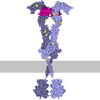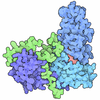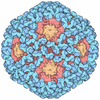Entry Database : PDB / ID : 6p7jTitle Crystal structure of Latency Associated Peptide unbound to TGF-beta1 Transforming growth factor beta-1 proprotein Keywords / / / / Function / homology Function Domain/homology Component
/ / / / / / / / / / / / / / / / / / / / / / / / / / / / / / / / / / / / / / / / / / / / / / / / / / / / / / / / / / / / / / / / / / / / / / / / / / / / / / / / / / / / / / / / / / / / / / / / / / / / / / / / / / / / / / / / / / / / / / / / / / / / / / / / Biological species Homo sapiens (human)Method / / / / Resolution : 3.501 Å Authors Stachowski, T.R. / Snell, M.E. / Snell, E.H. Funding support Organization Grant number Country National Science Foundation (NSF, United States) 1231306
Journal : Iucrj / Year : 2020Title : Structural insights into conformational switching in latency-associated peptide between transforming growth factor beta-1 bound and unbound statesAuthors : Stachowski, T.R. / Snell, M.E. / Snell, E.H. History Deposition Jun 5, 2019 Deposition site / Processing site Revision 1.0 Mar 11, 2020 Provider / Type Revision 1.1 Oct 11, 2023 Group / Database references / Refinement descriptionCategory chem_comp_atom / chem_comp_bond ... chem_comp_atom / chem_comp_bond / database_2 / pdbx_initial_refinement_model Item / _database_2.pdbx_database_accessionRevision 1.2 Nov 13, 2024 Group / Category / pdbx_modification_feature
Show all Show less
 Yorodumi
Yorodumi Open data
Open data Basic information
Basic information Components
Components Keywords
Keywords Function and homology information
Function and homology information Homo sapiens (human)
Homo sapiens (human) X-RAY DIFFRACTION /
X-RAY DIFFRACTION /  SYNCHROTRON /
SYNCHROTRON /  MOLECULAR REPLACEMENT /
MOLECULAR REPLACEMENT /  molecular replacement / Resolution: 3.501 Å
molecular replacement / Resolution: 3.501 Å  Authors
Authors United States, 1items
United States, 1items  Citation
Citation Journal: Iucrj / Year: 2020
Journal: Iucrj / Year: 2020 Structure visualization
Structure visualization Molmil
Molmil Jmol/JSmol
Jmol/JSmol Downloads & links
Downloads & links Download
Download 6p7j.cif.gz
6p7j.cif.gz PDBx/mmCIF format
PDBx/mmCIF format pdb6p7j.ent.gz
pdb6p7j.ent.gz PDB format
PDB format 6p7j.json.gz
6p7j.json.gz PDBx/mmJSON format
PDBx/mmJSON format Other downloads
Other downloads https://data.pdbj.org/pub/pdb/validation_reports/p7/6p7j
https://data.pdbj.org/pub/pdb/validation_reports/p7/6p7j ftp://data.pdbj.org/pub/pdb/validation_reports/p7/6p7j
ftp://data.pdbj.org/pub/pdb/validation_reports/p7/6p7j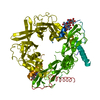
 Links
Links Assembly
Assembly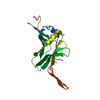
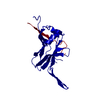
 Components
Components Homo sapiens (human) / Gene: TGFB1, TGFB / Plasmid: pTT3 / Cell (production host): HEK293 / Production host:
Homo sapiens (human) / Gene: TGFB1, TGFB / Plasmid: pTT3 / Cell (production host): HEK293 / Production host:  Homo sapiens (human) / References: UniProt: P01137
Homo sapiens (human) / References: UniProt: P01137 X-RAY DIFFRACTION / Number of used crystals: 1
X-RAY DIFFRACTION / Number of used crystals: 1  Sample preparation
Sample preparation SYNCHROTRON / Site:
SYNCHROTRON / Site:  APS
APS  / Beamline: 17-ID / Wavelength: 1 Å
/ Beamline: 17-ID / Wavelength: 1 Å molecular replacement
molecular replacement Processing
Processing MOLECULAR REPLACEMENT
MOLECULAR REPLACEMENT Movie
Movie Controller
Controller


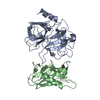
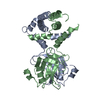
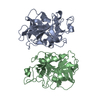
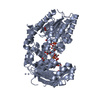
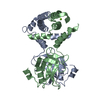
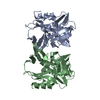
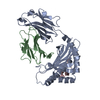
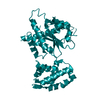
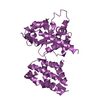
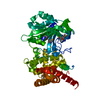
 PDBj
PDBj

